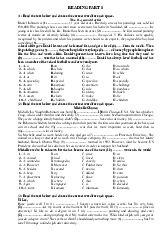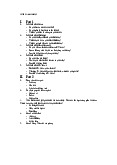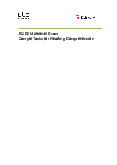


Preview text:
READING DỰ ĐOÁN PIC 17
What’s the purpose of gaining knowledge? A
‘I would found an institution where any person can find instruction in any subject' That was the
founders motto for Cornell University, and it seems an apt characterization of the different
university, also in the USA, where I currently teach philosophy. A student can prepare for a career
in resort management, engineering, interior design, accounting, music, law enforcement, you name
it. But what would the founders of these two institutions have thought of a course called Arson for
Profit’? I kid you not: we have it on the books. Any undergraduates who have met the academic
requirements can sign up for the course in our program in 'fire science’. B
Naturally, the course is intended for prospective arson investigators, who can learn all the tricks of
the trade for detecting whether a fire was deliberately set, discovering who did it, and establishing
a chain of evidence for effective prosecution in a court of law. But wouldn’t this also be the perfect
course for prospective arsonists to sign up for? My point is not to criticize academic programs in
fire science: they are highly welcome as part of the increasing professionalization of this and many
other occupations. However, it’s not unknown for a firefighter to torch a building. This example
suggests how dishonest and illegal behavior, with the help of higher education, can creep into
every aspect of public and business life. C
I realized this anew when I was invited to speak before a class in marketing, which is another of
our degree programs. The regular instructor is a colleague who appreciates the kind of ethical
perspective I can bring as a philosopher. There are endless ways I could have approached this
assignment, but I took my cue from the title of the course: 'Principles of Marketing’. It made me
think to ask the students, 'Is marketing principled?’ After all, a subject matter can have principles
in the sense of being codified, having rules, as with football or chess, without being principled in
the sense of being ethical. Many of the students immediately assumed that the answer to my
question about marketing principles was obvious: no. Just look at the ways in which everything
under the sun has been marketed; obviously it need not be done in a principled (=ethical) fashion. D
Is that obvious? I made the suggestion, which may sound downright crazy in light of the evidence,
that perhaps marketing is by definition principled. My inspiration for this judgement is the
philosopher Immanuel Kant, who argued that any body of knowledge consists of an end (or purpose) and a means. E
Let us apply both the terms 'means' and ‘end' to marketing. The students have signed up for a
course in order to learn how to market effectively. But to what end? There seem to be two main
attitudes toward that question. One is that the answer is obvious: the purpose of marketing is to
sell things and to make money. The other attitude is that the purpose of marketing is irrelevant:
Each person comes to the program and course with his or her own plans, and these need not even
concern the acquisition of marketing expertise as such. My proposal, which I believe would also
be Kant's, is that neither of these attitudes captures the significance of the end to the means for
marketing. A field of knowledge or a professional endeavor is defined by both the means and the
end;hence both deserve scrutiny. Students need to study both how to achieve X, and also what X is. F
It is at this point that ‘Arson for Profit’ becomes supremely relevant. That course is presumably all
about means: how to detect and prosecute criminal activity. It is therefore assumed that the end is
good in an ethical sense. When I ask fire science students to articulate the end, or purpose, of their
field, they eventually generalize to something like, ‘The safety and welfare of society,’ which
seems right. As we have seen, someone could use the very same knowledge of means to achieve a
much less noble end, such as personal profit via destructive, dangerous, reckless activity. But we
would not call that firefighting. We have a separate word for it: arson. Similarly, if you employed
the ‘principles of marketing’ in an unprincipled way, you would not be doing marketing. We have
another term for it: fraud. Kant gives the example of a doctor and a poisoner, who use the identical
knowledge to achieve their divergent ends. We would say that one is practicing medicine, the other, murder. Questions 1-6
Reading Passage has six sections, A-F.
Choose the correct heading for each section from the list of headings below.
Write the correct number, i-viii, in boxes 1-6 on your answer sheet. 1 Section A 2 Section B 3 Section C 4 Section D 5 Section E 6 Section F List of Headings
Courses that require a high level of commitment i
A course title with two meanings ii
The equal importance of two key issues iii iv
Applying a theory in an unexpected context v
The financial benefits of studying vi A surprising course title vii
Different names for different outcomes vii
The possibility of attracting the wrong kind of student i Questions 7-10 Complete the summary below.
Choose NO MORE THAN TWO WORDS from the passage for each answer.
Write your answers in boxes 7-10 on your answer sheet.
The ‘Arson for Profit’ course
This is a university course intended for students who are undergraduates and who are studying 7
. The expectation is that they will become 8 specialising in
arson. The course will help them to detect cases of arson and find 9 of criminal
intent, leading to successful 10 in the courts. Questions 11-14
Do the following statements agree with the views of the writer in Reading Passage?
In boxes 11-14 on your answer sheet, write
YES if the statement agrees with the views of the writer
NO if the statement contradicts the views of the writer
NOT GIVEN if it is impossible to say what the writer thinks about this 11
It is difficult to attract students onto courses that do not focus on a career. 12
The ‘Arson for Profit’ course would be useful for people intending to set fire to buildings. 13
Fire science courses are too academic to help people to be good at the job of firefighting. 14
The writer’s fire science students provided a detailed definition of the purpose of their studies.




